Cultural insights into Nepal
- 68.2 % of persons with disabilities in Nepal have no education. Among the disabled male population, 59.6 % have had no education, while a whopping 77.7 % of disabled females have had no access to education. (Source: "A Situation Analysis on Disability in Nepal")
- There is still a strong belief in Nepal that disability is due to sins of the past, fate, and God. In particular, more than half of the parents of persons with disabilities surveyed felt the disability of their child was due to fate and God's will. These beliefs prevent them from accessing appropriate health care treatment for their disabled children.
- In Nepal the majority of people view disability as a penance for sins committed in previous lives and thus strong prejudices are held against people with disabilities. Unfortunately most Nepalese are ignorant of the different causes, types, and cures for disability.
- The male-female literacy ratio in Nepal is 65:42 (2001 Census). Girls are discouraged from attending school, because they traditionally have to work at home. Seven Women is doing its bit to correct this gender imbalance.
- Nepalese society assigns tightly defined gender roles to men as breadwinners and women as homemakers. Marriage is seen as the most acceptable economic option for women as it offers the best way for them to gain access to property and land- via their husband- and secure their livelihood. Women with disabilities in Nepal are unlikely to marry as they are considered 'incapable of reproductive work'. Thus 80% of women with disabilities in Nepal remain unmarried and often struggle to find life's basic needs.
- Disabled men in Nepalese culture face similar constraints to that of disabled women in establishing a family life but their chances of marriage are higher, due to their entitlement to family property and greater likelihood of securing jobs. Men with disabilities in Nepal prefer not to marry women who have a disability as they fear the women will not be capable of their traditional roles or satisfying their husband's sexual wishes.
- Organisations like Seven Women have helped Nepalese women reduce their economic dependence on men, increased their bargaining position in the household, and enhanced their autonomy, economic dependence and self confidence.

